Health
The Influence of Sewing Machines on the Health and Morality of Workwomen
Nineteenth-century doctors worried that because sewing machines "produced such an excessive excitement of the sexual organs" they might have an immoral effect upon working women. Text from The Boston Medical and Surgical Journal (Aug 23, 1866):A young woman, whom he had known as the very picture of vigorous health, presented herself at his office in such a condition of emaciation, and with such a change of countenance, that he was greatly shocked at her appearance. The explanation which she gave was as follows.
For seven months, from morning till night, she had worked at a sewing machine, known as the "American machine." The constant motion of the lower extremities in propelling it had produced such an excessive excitement of the sexual organs that she was often compelled to suspend her work; and to the frequency of this effect and the fatigue resulting from it, she attributed the leucorrhoea and attendant loss of flesh and strength from which she was suffering.
The effect seemed to be naturally enough explained by the cause alleged, especially as in some of the machines at which she had worked the pedals were depressed alternately with one food and the other. This case, so serious in its nature, was regarded by M. Guibout as probably the result of a peculiar susceptibility on the part of the patient, and so very exceptional at the time as only worthy of record as a curiosity. But during the past year, he goes on to say, he found in the hospital Saint-Louis, three similar cases; and during the present year he had already found five in the same hospital.
He also adds that within a month "two females, entirely unknown to each other, and working in different shops, called upon him on the same day, to consult him for similar symptoms. The first of these, a blonde, in the most vigorous health when she began to work at the machine, in seven or eight months has become enfeebled, her embonpoint was gone, her general health had declined, and she had become the subject of a profuse leucorrhoea, which was daily increasing.
She said also that many of the girls in the same establishment were affected in the same way, by the same cause, "the continual movement of the lower limbs, the jar and the swaying of the body." She denied, however, that she had been troubled by the special symptoms mentioned by the first patient, but said that many of her companions had been. Many of them had been so annoyed as to be obliged frequently to suspend their work and leave the shop for the purpose of bathing with cold water.
The second of these two patients was a brunette, of entirely different temperament from the other. She had been obliged to give up her place after working at the machine for a year, on account of the same symptoms. To the inquiry as to any local excitement produced by it, she answered in the affirmative. To translate her own words: "Among 500 women who worked with me, there were at least 200 who, to my knowledge, suffered as I did; so that the operatives were constantly changing, none of them being able to stay long. It is a constant going and coming of women, who enter strong and well, and who go out weak and emaciated."
M. Guibout went on to recite other instances equally serious, but it is not necessary to quote them. The subject is one of very grave moment and worthy of the consideration of every physician. In the discussion which followed the reading of his paper, some of the members of the Society were disposed to question the frequency of the peculiar symptoms which he reported. He, however, maintained his position, urging that it was very difficult to get a confession from many of the victims of the machine, so that when directly interrogated, a negative response should not always be received as the truth. The large number of cases which had come under his own observation had led him to lay this painful subject before the Society.
I asked Microsoft's AI image creator to produce an image based on the article's title, and this is what it came up with:

Posted By: Alex - Wed May 17, 2023 -
Comments (6)
Category: Health, Medicine, Nineteenth Century
Mechanical Chiropractor
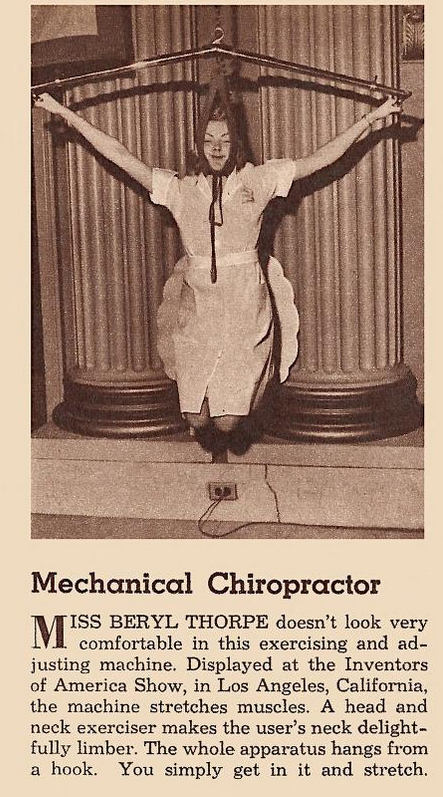
Source.
Posted By: Paul - Sun Apr 30, 2023 -
Comments (0)
Category: Health, Hobbies and DIY, Lawsuits, 1940s
Burned by a belch
In 1890, Dr. James McNaught of Manchester reported in The British Medical Journal the strange case of a 24-year-old factory worker whose burp caught on fire while he was holding a match, badly burning his face and lips. McNaught managed to replicate the burning belch with the man in his office, confirming it really did happen. He diagnosed the problem as the "eructation of inflammable gas" from the man's stomach.McNaught concluded that the man suffered from a disorder that caused food to ferment in his stomach and produce flammable gas, instead of being digested. He advised the man to eat foods that would pass more quickly out of his stomach, to avoid the fermentation.
More info: British Medical Journal, "A Case of Dilatation of the Stomach Accompanied by the Eructation of Inflammable Gas"
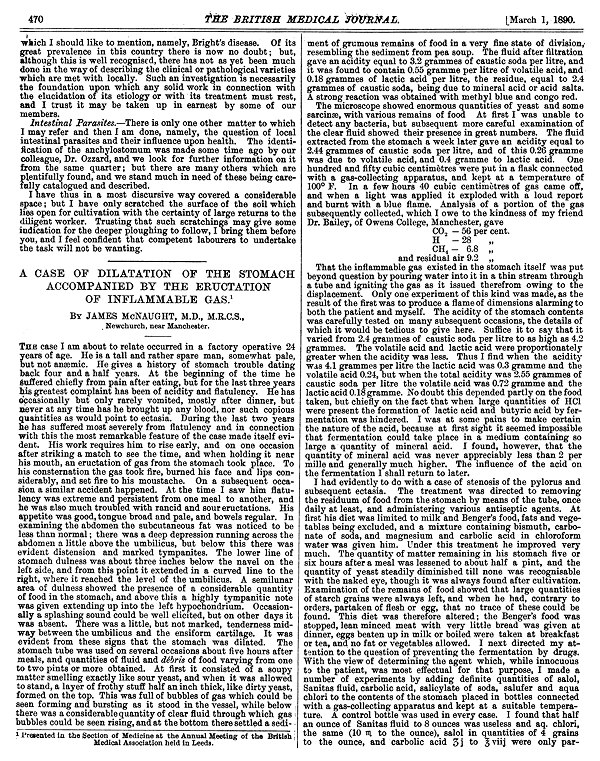
Posted By: Alex - Fri Apr 21, 2023 -
Comments (3)
Category: Health, Stomach, Smells and Odors
Follies of the Madmen #560
Posted By: Paul - Wed Mar 29, 2023 -
Comments (1)
Category: Anthropomorphism, Body, Cryptozoology, Health, Advertising, 1960s, 1970s
Asneezia, Part 2
Two weeks ago I posted about 'Asneezia,' which was the name that a doctor in India (G.D. Shukla) gave to the condition of being unable to sneeze. His non-sneezing patients also suffered from mental illness. He published his report about Asneezia in 1985.I was somewhat skeptical about the reality of Asneezia. But yesterday, purely by chance, I came across the newspaper story below from 1958 about doctors at a New England psychiatric hospital who noted the odd fact that their patients never suffered from allergies, and so never sneezed. "If you hear a sneeze," one of them said, "you can know it's a staff member's."
As far as I know, Dr. Shukla (reporting about Asneezia in 1985) was unaware of this earlier report from 1958. But having two independent reports of a connection between not-sneezing and mental illness, from different times and different cultures, would seem to confirm the reality of the condition.

Boston Globe - June 16, 1958
Posted By: Alex - Mon Nov 07, 2022 -
Comments (0)
Category: Health, Mental Health and Insanity
Asneezia
In a 1985 report published in the British Journal of Psychiatry, Dr. G.D. Shukla brought a new condition to the attention of the medical community — the inability to sneeze. He named this 'Asneezia'. The sufferers were 'Asneezics'. His original article is behind a paywall, but a summary from Brain/Mind Bulletin is below: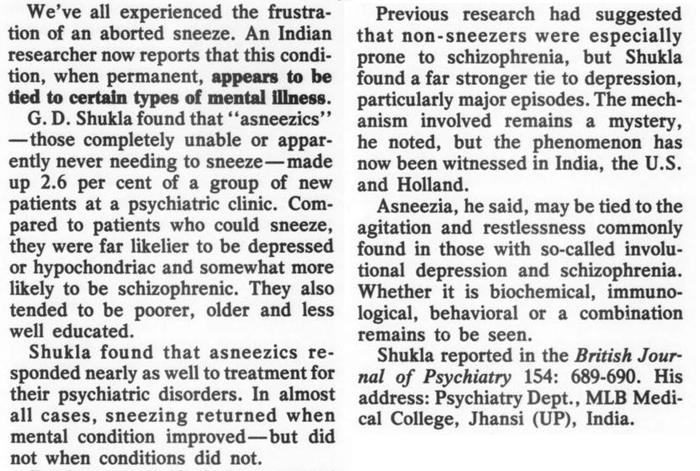
Brain/Mind Bulletin - July 1990
Later correspondents to the British Journal of Psychiatry were skeptical. One questioned whether Shukla's patients really suffered from this condition, or if they were simply delusional. Another proposed verifying the reality of Asneezia by exposing patients to "the most noxious inhalant allergen."
Posted By: Alex - Fri Oct 21, 2022 -
Comments (2)
Category: Health, Psychology
The Health Dangers of Sleeping on a Hartmann Line
My Great Aunt recently died at the age of 100. Throughout her life she was very much into alternative medicine, and she kept hundreds of newsletters from various alt-health practitioners. Most of them aren't particularly interesting, but while going through her stuff I've found a few oddities, such as a 1990 newsletter warning of the danger of sleeping on Hartmann Lines.I'd never heard of Hartmann Lines. Wikipedia describes them as "a scientifically unproven grid of invisible energy lines of the Earth's inherent radiation".
But how to know if you're sleeping on a Hartmann line? Well, if you've got a cat and it likes to sleep in your bed, you may be in trouble because apparently cats love sleeping on Hartmann lines. (I'm in trouble!)
I've posted a few snippets from the newsletter below, and also uploaded the full newsletter as a pdf file.



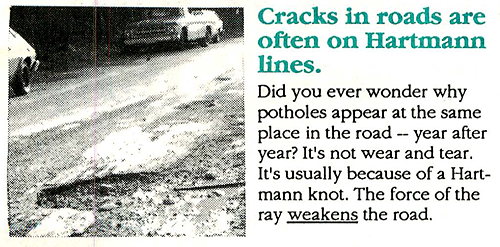
Posted By: Alex - Tue May 24, 2022 -
Comments (4)
Category: Health, Patent Medicines, Nostrums and Snake Oil, Cats
An unusual rectal foreign body
An article recently published in the International Journal of Surgery Case Reports describes the case of an unusual foreign body (a dumbbell) removed from a patient's rectum. It also provides a brief overview of the phenomenon of unusual foreign bodies that end up in rectums:
Posted By: Alex - Sat Apr 23, 2022 -
Comments (1)
Category: Health, Surgery, Sex Toys
Hit Hand, Regained Sight
June 1955: Peter Barr struck the palm of his left hand with his right fist to stress a point while arguing with his wife. And suddenly he was able to see again. He had been completely blind for three years.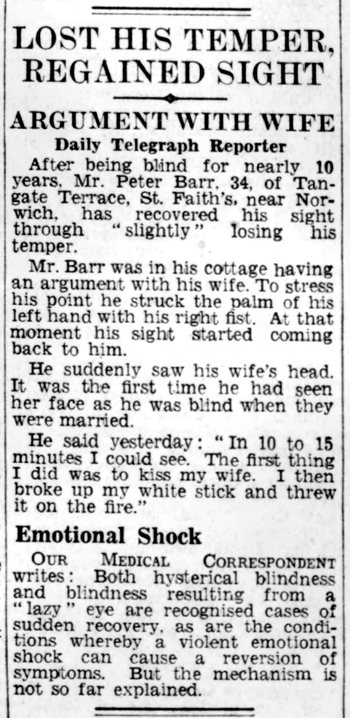
London Daily Telegraph - June 3, 1955
Other cases of accidental cures we've previously posted about:
- the man who regained his sight after a fall
- the woman whose sneeze cured her deafness
- The man whose blindness, deafness, and baldness was cured by lightning
- Blind Man Spontaneously Regains Sight After 30 Years
Posted By: Alex - Sat Apr 16, 2022 -
Comments (2)
Category: Health, 1950s, Eyes and Vision
Pneumonia Blouse
In the early twentieth century, women began wearing low-necked, gauzy blouses. Conservative critics branded them "pneumonia blouses" — warning that they would cause the women wearing them to catch pneumonia.More info: Jonathan Walford's blog

Example of a pneumonia blouse
Source: Holly Vogue Vintage
I often see young women out and about, dressed completely inappropriately for the cold weather, suffering for the sake of fashion. So the spirit of the pneumonia blouse seems to be alive and well, if not the specific style.

Victorian to Vamp: Women's Clothing 1900-1929, by Paula Jean Darnell
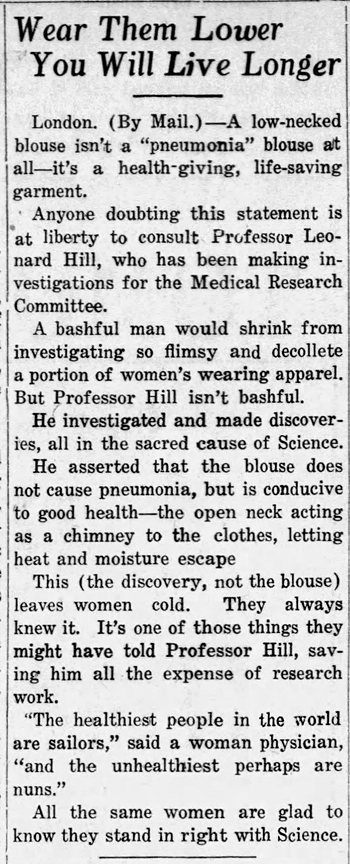
University Daily Kansan - Mar 18, 1920
Posted By: Alex - Sat Feb 05, 2022 -
Comments (3)
Category: Fashion, Health, 1900s

| Who We Are |
|---|
| Alex Boese Alex is the creator and curator of the Museum of Hoaxes. He's also the author of various weird, non-fiction, science-themed books such as Elephants on Acid and Psychedelic Apes. Paul Di Filippo Paul has been paid to put weird ideas into fictional form for over thirty years, in his career as a noted science fiction writer. He has recently begun blogging on many curious topics with three fellow writers at The Inferior 4+1. Contact Us |




